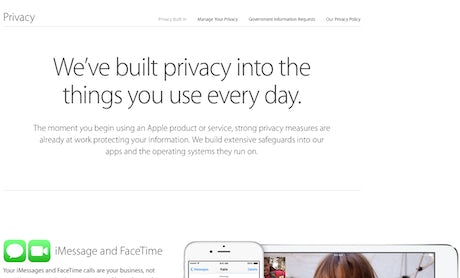Apple seeks to quell privacy concerns with open letter from Tim Cook
Apple’s CEO Tim Cook has penned an open letter to its customers outlining its commitment to protecting its users’ privacy following the high profile nude celebrity photo leak scandal as the company seeks to repair some of the brand damage caused by the alleged “hack”.

The letter forms part of Apple’s new privacy microsite, which explains the “extensive safeguards” the company has built into its apps and the operating systems they run on.
Cook says: “Our commitment to protecting your privacy comes from a deep respect for our customers. We know that your trust doesn’t come easy. That’s why we have and always will work as hard as we can to earn and keep it.”
The letter also appears to take a dig at internet service companies such as Google and Facebook, which gather information on data in order to sell targeted advertising to brands.
“A few years ago, users of Internet services began to realise that when an online service is free, you’re not the customer. You’re the product. But at Apple, we believe a great customer experience shouldn’t come at the expense of your privacy.
“Our business model is very straightforward: we sell great products. We don’t build a profile based on your email content or web browsing habits to sell to advertisers. We don’t ’monetise’ the information you store on your iPhone or in iCloud. And we don’t read your email or your messages to get information to market to you. Our software and services are designed to make our devices better. Plain and simple,” Cook writes.
He goes on to explain that a “very small part” of its business, iAd, does serve advertisers. But Cook says this ad network applies the same privacy policy as any other Apple product.
“It doesn’t get data from Health and HomeKit, Maps, Siri, iMessage, your call history, or any iCloud service like Contacts or Mail, and you can always just opt out altogether,” he adds.
Cook also uses the letter to respond to concerns that may have been raised by whistleblower Edward Snowden’s numerous NSA revelations, saying Apple has “never worked” with any government agency from any country to create a backdoor in any of its products or services, nor allowed access to its servers. “And we never will,” he states.
The leak of intimate photos of a number of celebrities including Jennifer Lawrence and Mary Elizabeth Winstead from their iCloud accounts earlier this month had threatened to cast a shadow on Apple’s iPhone and Watch announcement days later. But any possibility of dampening spirits was soon set aside as the unveiling of two new handsets and its first wearable device sent social networks and media abuzz with talk about the brand.
Apple’s Buzz score – YouGov BrandIndex’s measure of the positive and negative things heard about the brand – did dip slightly when details of the leak first emerged. But it is now up a statistically significant 6.9 points on the previous month to a score of 14.4, topping BrandIndex’s Handsets and Operator league table and far ahead of nearest rival Samsung, with a score of 8.1.
The company’s reputation score is stable at 33.6 points on the 30 days prior and it did not suffer any significant dips even when news of the leak hit the headlines. This may have been due to the company stating that the photos were most likely obtained by hackers correctly guessing the celebrities’ iCloud passwords or through phishing, rather than a via a security breach that could affect other users.
The scandal was the target of a potshot from PayPal this week. The Ebay-owned payments company took out print ads in US newspapers which appeared to have the intent of undermining Apple’s newly announced Apple Pay mobile payments service.
The ad read: “We the people want our money safer than our selfies. PayPal, protecting the people economy.”
The ad has since been criticised by observers for being overly defensive, with venture capitalist Keith Rabois, also a former PayPal executive, tweeting “Dumbest ad campaign ever?”



